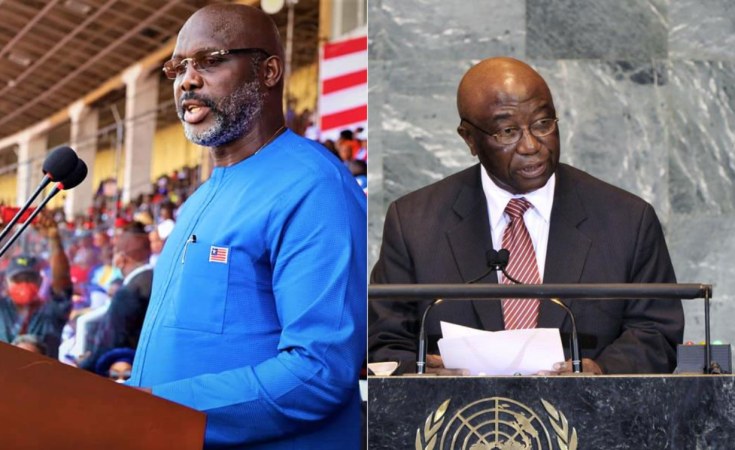As he leads with 3,119 votes, representing 60.17%, while Weah is far behind with 1,681 votes ( 32.43%), according to NEC's official ongoing tally.
Former Vice President Joseph Boakai may have taken an early lead over President George Weah, but he faces an uphill battle to maintain it.
Boakai, who is hoping to amend his defeat to Weah in 2017, is currently in a comfortable lead, according to the National Elections Commission (NEC).
However, Boakai's lead is based on "tally captures from two of the fifteen counties' reporting, namely Bomi and Montserrado counties, which represent 16 out of 5,890 polling places across the country.
In Bomi County, out of a total of 171 polling precincts, 13 have reported, constituting 7.60% of the vote. Boakai, of the opposition Unity party, is in the lead with 2,543 votes, making up 64.01%, with 3,973 total votes and 153 invalid votes, NEC data shows.
President Weah, according to the NEC's latest results, has 1,134 votes, accounting for 28.54%. Dark-horse candidate Alexander Cummings, based on the 13 precincts reported in Bomi, is struggling in fifth place with 32 votes, constituting 0.81%.
In Montserrado, the nation's most populous voting county, the former Vice President is also in a close lead, although only three precincts have reported, leaving over 2,000 polling places remaining.
Out of a total of 2,008 polling places, three have reported so far. Boakai received a total of 576 votes, constituting 47.58%, while Weah is closely behind with 547 votes, representing 45.17%, according to the NEC.
Cummings is currently in third place with 39 votes, constituting 3.22%. The combined votes from the reporting precincts are 1,243, with 32 invalid votes.
Based on the votes from the reporting precincts, the former Vice President has gathered 3,119 votes, representing 60.17%, while Weah is far behind with 1,681 votes, constituting 32.43%, as disclosed by Davidetta Browne-Lansanah, the Chairperson of the electoral body.
Cummings is in a distant fourth place, trailing the relatively unknown Edward Appleton, who has received 92 votes, representing 1.77%. Cummings' previous vote count was 71, constituting 1.37%.
It is unclear whether Boakai, who sources say is pleased with the trend of his lead and deeply confident of winning against his opponents in the first round, can pull off a surprise win in Montserrado County, which no ruling party has won in the postwar history of Liberia.
During the President's time in the opposition, Montserrado was his stronghold. However, with just over two months remaining in his six-year term, it is uncertain whether he still maintains a grip on the county, as his administration's achievements on the issues of poverty, unemployment, and corruption remain mixed.
If Boakai manages to win in Montserrado and performs well in other battleground counties, analysts say he would have a chance of potentially winning the election in the first round, depending on the voting margin.
The three counties combined constitute the top five vote-rich counties, which are crucial for winning the presidency, with the remaining two being Bong and Margibi counties.
According to analysts, Boakai or Weah needs to win two of the top five counties, in addition to Montserrado County, to either win in the first round or advance to a runoff.
If the two frontrunners secure less than 50 percent of the vote in the first round, a runoff will be held on November 7. The NEC has 15 days from the day the vote was cast to announce the election results. This means that the final result of the election will be known by October 25 or even sooner.
As the NEC continues to announce results up to its October 25 deadline, the expected outcome is a hotly contested battle between the two frontrunners, leaving the other 18 presidential candidates far behind.
The October 10 polls have been billed as a referendum on the incumbent candidate, President George Manneh Weah, who rode to victory with high hopes in 2017, marking a historic moment as Liberia's first democratically elected leader since 1944.
Meanwhile, the NEC's Chairperson has warned that pre-election result pronouncements by contestants violate the country's electoral law and are dangerous.
According to Lansanah, the NEC is the only body, by law, allowed to pronounce results, and she calls on candidates involved in such acts to desist immediately.
So far, most of the contenders in the October 10 general poll have taken to social media to announce some form of result, while others have already begun conceding.
In a related development, the U.S. Embassy has called on Liberians to "remain calm and peacefully await the outcomes of Tuesday's polls."
"We commend the commitment and dedication displayed by the citizens of Liberia in exercising their right to vote and engaging in the electoral process," the Embassy said.
It added, "We urge all citizens, political parties, and political aspirants to await official results calmly, patiently, and peacefully from the National Elections Commission NEC."


